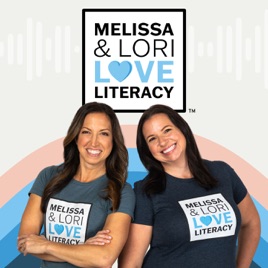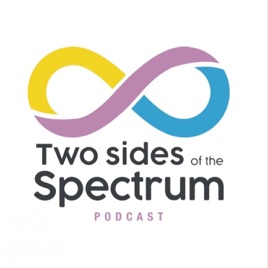
Advertise on podcast: Melissa & Lori Love Literacy ™
Rating
4.8 from
Categories
Country
This podcast has
235 episodes
Language
Publisher
Explicit
No
Date created
2019/05/10
Average duration
34 min.
Release period
6 days
Description
Melissa & Lori Love Literacy ™ is a podcast for educators interested in the science of reading. Hear the latest research on teaching reading and writing and learn how to make it practical for your classroom. Our guests include some of the most well-known literacy researchers and experts, as well as teachers and leaders doing the hard work every day!
Podcast episodes
Check latest episodes from Melissa & Lori Love Literacy ™ podcast
Ep. 184: First Steps for Reading with Spencer Russell (Quick Tips from Our Teacher Friends)
2024/02/23
Spencer Russell, a former kindergarten and first-grade teacher and the founder of Toddlers Can Read, shares his motivation for teaching reading and emphasizes the importance of simplifying the teaching process. He provides practical tips for starting with letter sounds and engaging children in fun learning activities. Spencer also discusses the importance of assessing understanding and offers guidance on where to start when teaching letter sounds. Listeners can find Spencer on social media at ToddlersRead or visit ToddlersRead.com.
Takeaways
Start with letter sounds that are easier to pronounce and more familiar to children.Engage children in learning activities that involve movement and play.Assess understanding and retention through quick and frequent assessments.Resources
Find Spencer on Instagram, TikTok, Facebook or ToddlersRead.comCheck out these videos on Instagram: Teach a Toddler to Read in 3 Easy Steps, Mispronouncing Sounds, Fourth Graders Reading at K Level Where Do I Start?Connect with us
Facebook and join our Facebook Group Twitter Instagram Don't miss an episode! Sign up for FREE bonus resources and episode alerts at LiteracyPodcast.com
Helping teachers learn about science of reading, knowledge building, and high quality curriculum.
more
Ep. 183: Aligning Phonemic Awareness Instruction to Research
2024/02/16
In this conversation, Becky Pallone and Michael Hart discuss how their phonemic awareness instruction has evolved over time. They emphasize the importance of blending and segmenting as key skills in phonemic awareness and highlight the benefits of incorporating letters in phonemic awareness instruction. They will also provide practical tips for you!
Takeaways
Incorporating letters in phonemic awareness can strengthen letter-sound correspondence.Teachers should prioritize blending and segmenting in phonemic awareness instruction.Teacher knowledge and curriculum are both important in phonemic awareness instruction. Resources
Measured Mom CVC Word ListPam Kastner Wakelet Resources: The Literacy CollectionExplicit Instruction, Anita ArcherContinuous Phonation Webinar, Selina Gonzales FryeUniversity of Florida Literacy Institute (UFLI)Goyen Foundation Twitter/XConnect with us
Facebook and join our Facebook Group Twitter Instagram Don't miss an episode! Sign up for FREE bonus resources and episode alerts at LiteracyPodcast.com
Helping teachers learn about science of reading, knowledge building, and high quality curriculum.
more
Ep. 182: Plain Talk Conference Recap
2024/02/09
Melissa and Lori just returned from the Plain Talk About Literacy & Learning Conference in New Orleans and they will share their takeaways with YOU! Attendees called in while at the conference to share aha moments and key takeaways. You won't want to miss this one!
2024 Plain Talk Conference Presenters
Podcast Episodes We Mentioned
Episode 44: Elevating the Education Profession with The Right to Read ProjectEpisode 116: Sonia Cabell on the Importance of Content-Rich ELA InstructionEpisode150: Science of Reading for ALL Students: Intervention for Secondary StudentsEpisode158: Science of Reading Beyond Phonics: The Ultimate Goal of Reading with Doug FisherEpisode 170: All About Read-Alouds with Molly NessConnect with us
Facebook and join our Facebook Group Twitter Instagram Don't miss an episode! Sign up for FREE bonus resources and episode alerts at LiteracyPodcast.com
Helping teachers learn about science of reading, knowledge building, and high quality curriculum.
more
Ep. 181: What Research Says About Phonemic Awareness with Matt Burns
2024/02/02
Matt Burns discusses the importance of phonemic awareness in reading instruction. Phonemic awareness is an outcome of skilled reading, not a precursor, and it has a reciprocal relationship with reading. Matt also emphasizes the need to focus on decoding skills in second, third, and fourth grade, rather than solely on phonemic awareness. Matt provides practical takeaways for teachers and recommends additional resources for learning about phonemic awareness.
Takeaways
Phonemic awareness is an outcome of skilled reading, not a precursor.Phonemic awareness and reading have a reciprocal relationship.Decoding skills are a strong predictor of reading success.Nonsense word fluency assessments can be beneficial for assessing decoding skills.Avoid teaching nonsense words and focus on decoding instead.Resources
Phonemic Awareness, Research, Misconceptions, and Fads with Dr. Matt BurnsThey Say You Can Do Phonemic Awareness Instruction “In the Dark”, But Should You? A Critical Evaluation of the Trend Toward Advanced Phonemic Awareness TrainingRIP to Advanced Phonemic Awareness | Shanahan on LiteracyPhonemic Awareness with Letters YouTube video, Matt BurnsMatt Burns YouTube Channel National Reading Panel Report Elkonin Boxes, Reading RocketsFlorida Center for Reading Research UFLI Foundations Ep. 159: Back to School: Science of Reading or Snake Oil with Holly Lane Road to the Code, Book IES Practice Guides Empirical Analysis of Drill Ratio Research: Refining the Instructional Level for Drill Tasks, Matt Burns (meta-analysis)Connect with us
Facebook and join our Facebook Group Twitter Instagram Don't miss an episode! Sign up for FREE bonus resources and episode alerts at LiteracyPodcast.com
Helping teachers learn about science of reading, knowledge building, and high quality curriculum.
more
Ep. 180: Teaching the Alphabet with Shayne Piasta
2024/01/26
Shayne Piasta discusses best practices for teaching alphabet knowledge. She tells us what the research suggests about teaching letter names and sounds, why teaching a letter of the week may not be the most effective approach, and an order to teach letters. The best part? She shares concrete ideas and strategies for classroom practice.
Takeaways
Teach both letter names and sounds simultaneously.Consider the acrophonic principle, where the letter name gives clues to its sound.Avoid teaching letters of the week and consider a faster pacing for letter instruction.Be intentional about the order of teaching letters, considering children's names and frequency of letters in text.Use differentiated instruction and embedded mnemonics for effective alphabet instruction.Resources
Handbook on the Science of Early LiteracyThe Science of Early Alphabet Instruction, chapter 7Ohio State University Alphabet Learning and Instruction research and articlesOhio State University Early Literacy and Learning LabEpisode 164: Misconceptions About Learning to Read with Carolyn Strom Connect with us
Facebook and join our Facebook Group Twitter Instagram Don't miss an episode! Sign up for FREE bonus resources and episode alerts at LiteracyPodcast.com
Helping teachers learn about science of reading, knowledge building, and high quality curriculum.
more
Ep. 179: The RAND Reading Model with Hugh Catts
2024/01/19
Summary
In this episode, the hosts discuss the RAND Model, a heuristic for thinking about reading comprehension. The model was developed in the late 1990s by the RAND Corporation in response to a need for more research on comprehension. The model considers three main components: the reader, the text, and the purpose or activity of reading. It emphasizes the active role of the reader in constructing meaning from the text and highlights the importance of text complexity, coherence, genre, and the context in which reading takes place. The hosts also explore the challenges of measuring reading comprehension and suggest a curriculum-based assessment approach.
Takeaways
The RAND Model is a heuristic for thinking about reading comprehension that considers the reader, the text, and the purpose or activity of reading.Text complexity, coherence, genre, and the context in which reading takes place are important factors in comprehension.Measuring reading comprehension with standardized tests can be challenging due to the complexity of the construct.A curriculum-based assessment approach that measures comprehension within specific disciplines may provide a more accurate and fair assessment of reading ability.Resources
Ep. 177: The Five Pillars of Reading with Hugh CattsEp. 178: The Simple View and Scarborough’s Reading Rope with Researcher Hugh Catts Five Pillars of Reading with Hugh Catts Follow researcher Hugh Catts on Twitter (or X)A Heuristic for Thinking About Reading Comprehension, or the RAND Model ICYMI: Ep. 118: Rethinking Reading Comprehension with Researcher Hugh CattsConnect with us
Facebook and join our Facebook Group Twitter Instagram Don't miss an episode! Sign up for FREE bonus resources and episode alerts at LiteracyPodcast.com
Helping teachers learn about science of reading, knowledge building, and high quality curriculum.
more
Ep. 178: The Simple View and Scarborough’s Reading Rope with Hugh Catts
2024/01/12
Summary
In this episode, Hugh Catts discusses two popular reading models: the Simple View of Reading and Scarborough's Reading Rope. The Simple View of Reading highlights the importance of word recognition and language comprehension in reading comprehension. It emphasizes that if a child struggles in one area, it will affect their overall reading comprehension. Scarborough's Reading Rope provides a more detailed breakdown of the components involved in reading, including background knowledge, vocabulary, language structures, verbal reasoning, strategies, and literacy knowledge. Both models help educators understand the complexity of reading and the interaction between different components.
Takeaways
The Simple View of Reading emphasizes the importance of word recognition and language comprehension in reading comprehension.Scarborough's Reading Rope provides a more detailed breakdown of the components involved in reading.Both models highlight the complexity of reading and the interaction between different components.Effective reading instruction should focus on developing both word recognition and language comprehension skills.Resources
Ep. 177: The Five Pillars of Reading with Hugh CattsFollow researcher Hugh Catts on Twitter (or X)The Simple View of Reading Scarborough’s Reading Rope ICYMI: Ep. 118: Rethinking Reading Comprehension with Researcher Hugh Catts
Connect with us
Facebook and join our Facebook Group Twitter Instagram Don't miss an episode! Sign up for FREE bonus resources and episode alerts at LiteracyPodcast.com
Helping teachers learn about science of reading, knowledge building, and high quality curriculum.
more
Ep. 177: The Five Pillars of Reading with Hugh Catts
2024/01/05
Summary
In this episode, the hosts discuss the five pillars from the National Reading Panel and their history. They explore the confusion that can arise from viewing these pillars as a model of how reading works. The role of fluency and the importance of differentiating instruction for the five pillars are also discussed. The conversation concludes with a reevaluation of the five pillars and a key takeaway to look beyond them. The next episodes will cover three other reading models.
Takeaways
The five pillars from the National Reading Panel are phonemic awareness, phonics, fluency, vocabulary, and comprehension.The five pillars should be viewed as interconnected and treated differently in instruction.The actual chapters of the National Reading Panel focus on alphabetics, fluency, and comprehension.It is important to look beyond the five pillars and consider other reading models.
Resources
Follow researcher Hugh Catts on Twitter (or X)The National Reading Panel Report The Five Pillars of Reading Graphic The Narrow View of Reading, Alan Kamhi The Narrow View of Reading Promotes a Broad View of Comprehension, Hugh Catts ICYMI: Ep. 118: Rethinking Reading Comprehension with Researcher Hugh CattsConnect with us
Facebook and join our Facebook Group Twitter Instagram Don't miss an episode! Sign up for FREE bonus resources and episode alerts at LiteracyPodcast.com
Helping teachers learn about science of reading, knowledge building, and high quality curriculum.
more
#1 2023 Countdown: Ep. 143: Maximizing Small Group Reading Instruction
2023/12/29
FROM MARCH 10, 2023
Today we’ll be talking to a team of authors about a recent article they published on small group instruction, titled Maximizing Small-Group Reading Instruction. We ask and answer important questions about small group instructional time: What is the appeal of small group reading instruction? Why has it been popular? What does the research say? What do we need to know about effective small-group reading instruction? What are some best practices?
Resources
Maximizing Small-Group Reading Instruction (published in The Reading Teacher) Dr. Neena Saha’s Reading Research Recap of this research What Should Small Group Instruction Look Like? Tim Shanahan Reinterpreting the development of reading skills Scott Paris Applying New Visions of Reading Development in Today's Classrooms Kay Stahl Text Project with Freddy Hiebert Choice Words: How Our Language Affects Our Children’s Learning by Peter JohnstonConnect with us
Facebook and join our Facebook Group Twitter Instagram Don't miss an episode! Sign up for FREE bonus resources and episode alerts at LiteracyPodcast.com
Helping teachers learn about science of reading, knowledge building, and high quality curriculum.
more
Episode 176: Quick Q&A: Why Shouldn’t We Level Students and What Should We Do Instead?
2023/12/26
Why shouldn’t we level students?
Professor and researcher Kristin Conradi-Smith from episode 143 says, “We lack research for differentiation by text levels.There's simply no support for it.” Teaching with a leveled reading, sometimes known as guided reading, approach isn’t the most effective way to teach or learn to read.
Instead, we can
Support students’ access to complex texts through scaffolds and building knowledge using language comprehension. Use students' prior knowledge and match that knowledge to text topic demands.Read text sets - a group of texts on the same topic - to build students’ knowledge and vocabulary. Practice and model oral reading fluency, rearead, and use comprehension strategies.Resources
Episode 143: Maximizing Small Group Reading Instruction Matt Burns F&P BAS and LLI ResearchMatt Burns Leveling Students: Why we do it, why we shouldn’t, and what we should do insteadTim Shanahan Should We Teach at Reading Level? Tim Shanahan blogs What does the Easter bunny have in common with the independent reading level?Tim Shanahan presentation Science of Reading LevelsDr. Kristen Schrauben Science of Reading What I Should Have Learned in College Private Facebook Group Presentation Giving Up F&PConnect with us
Facebook and join our Facebook Group Twitter Instagram Don't miss an episode! Sign up for FREE bonus resources and episode alerts at LiteracyPodcast.com
Helping teachers learn about science of reading, knowledge building, and high quality curriculum.
more
#2 2023 Countdown: Ep. 142: Structured Literacy in Small Group Time
2023/12/22
FROM FEBRUARY 24, 2023
In today’s episode, we discuss the structure and content of the literacy block. How can we teach using structured literacy in small groups? Kinder teacher Casey Jergens and author Natalie Wexler join us to connect theory and practice. Casey previously taught using a guided (leveled) reading approach with lots of small group time. In recent years, he’s switched to focus on Tier 1 instruction aligned to structured literacy, which supports access for all students.
Resources
Elementary Classrooms Are Too Noisy For Kids To Learn by Natalie Wexler Casey’s Twitter HandleNatalie Wexler’s Twitter Handle Connect with us
Facebook and join our Facebook Group Twitter Instagram Don't miss an episode! Sign up for FREE bonus resources and episode alerts at LiteracyPodcast.com
Helping teachers learn about science of reading, knowledge building, and high quality curriculum.
more
Episode 175: Quick Q&A - What Does Research Say About Small Group Reading Instruction?
2023/12/19
What does the research say about small group reading instruction?
Resources
Episode 142: Structured Literacy in Small Group TimeEpisode 143: Maximizing Small Group Reading Instruction Maximizing Small Group Reading Instruction (Conradi-Smith, Amendum, Williams, 2022)Differentiated Literacy Instruction: Boondoggle or Best Practice? (Puzio, Colby, Nichols, 2020)Meta-Analyses of the Effects of Tier 2 Type Reading Interventions in Grades K-3 (Wanzek, et. al, 2016) Connect with us
Facebook and join our Facebook Group Twitter Instagram Don't miss an episode! Sign up for FREE bonus resources and episode alerts at LiteracyPodcast.com
Helping teachers learn about science of reading, knowledge building, and high quality curriculum.
more
Podcast reviews
Read Melissa & Lori Love Literacy ™ podcast reviews
Jean Forst
2024/01/23
Excellent podcast
Excellent podcast! I’ve learned so much. Thank you for your work!
kbogota
2023/12/30
Excellent
There is so much great knowledge shared on this podcast! Thank you :)
lookingforournextdog
2023/11/01
Great interviews
I have been listening to this podcast for a while and continue to be impressed by the various perspectives of the guests who are interviewed. This pod...
more
Shureeck
2023/08/18
More confident teacher
I am grateful for the things that I learn from this podcast that help me be a more confident teacher.
Mr. J Mill
2023/08/04
Very informative—thank you!!
I love this podcast, specifically Episode 150 with the focus on secondary learners! As a high school remedial ELA teacher, I appreciate Melissa and Lo...
more
Jcscallan
2023/07/16
Thought Provoking
The speakers that these ladies have on their show always leave me thinking about how I can improve my instruction and implement all the things they ta...
more
jbg781
2023/07/22
Good content
I really appreciate the content this podcast provides. The ONLY thing that is very hard to listen to is the nervous laughter or laughter for no reason...
more
KatiaHazen
2023/06/26
Timely, Urgent and Important!
The information and resources shared in this podcast is so crucial for teachers, administrators, parents and all stakeholders to hear and understand.
...
more
Mama Seuss
2023/05/13
Thank you!
Your passion for teaching reading really comes through in your podcasts. The work you are doing, shining a light on how reading is taught, is invaluab...
more
Juno364
2023/04/06
Thank you!
This podcast has paved the path for my SOR journey. Thank you for challenging us to know better and do better.
Podcast sponsorship advertising
Start advertising on Melissa & Lori Love Literacy ™ & sponsor relevant audience podcasts
You may also like these education Podcasts

4.6
4725
1550
Ben Greenfield Life
Ben Greenfield

4.8
61081
255
anything goes with emma chamberlain
emma chamberlain

4.9
2274
331
Habits and Hustle
Jen Cohen and Habit Nest

4.7
629
287
Under The Hood show
Nordstroms Automotive Inc.

4.8
537
303
No Hay Tos (Real Mexican Spanish)
Sonoro | Roberto Andrade & Héctor Libreros

4.2
672
40
The Survivalist Prepper Podcast
The Survivalist Prepper Website and Prepping Podcast

4.7
204
88
Two Sides of the Spectrum
Meg Ferrell

4.9
3440
680
The Game w/ Alex Hormozi
Alex Hormozi

4.5
984
949
How to Be Awesome at Your Job
How to be Awesome at Your Job

4.2
2946
680
Keeping It Real: Conversations with Jillian Michaels
Jillian Michaels | Crossover Media Group



